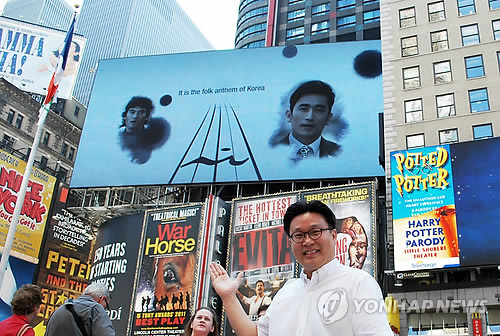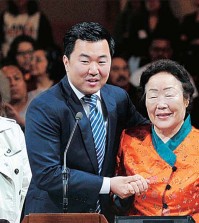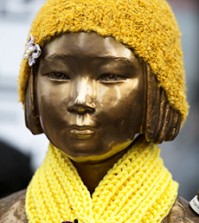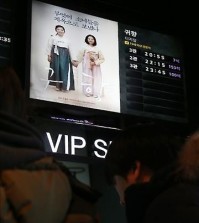- California Assembly OKs highest minimum wage in nation
- S. Korea unveils first graphic cigarette warnings
- US joins with South Korea, Japan in bid to deter North Korea
- LPGA golfer Chun In-gee finally back in action
- S. Korea won’t be top seed in final World Cup qualification round
- US men’s soccer misses 2nd straight Olympics
- US back on track in qualifying with 4-0 win over Guatemala
- High-intensity workout injuries spawn cottage industry
- CDC expands range of Zika mosquitoes into parts of Northeast
- Who knew? ‘The Walking Dead’ is helping families connect
Dokdo, bibimbap ads remain unpaid
“Middleman got away with money”

Seo Kyoung-duk, professor of Sungshin Women’s University and self-proclaimed Korea PR expert (Yonhap)
By Jane Han
NEW YORK — It’s no longer surprising to see Dokdo, “comfort women” and other politically-charged issues in Korea pop up in ads on Times Square billboards. But now, we may want to start wondering: Have they been paid for?
It turns out that high-profile Dokdo and comfort women ads to be paid for by singer Kim Jang-hoon and a bibimbap ad, to be sponsored by MBC’s Infinite Challenge, are currently overdue.
All of them — coordinated by “Korea publicist” Seo Kyoung-duk — were put up on Times Square billboards operated by City Outdoor USA, a New York-based company that filed a lawsuit for the missing payments.
According to the complaint, acquired by Korean-American journalist Ahn Chi-yong, the company is demanding approximately $70,000 (75 million won) for four billboard signs that have been overdue since 2012.
It’s been widely publicized that singer and political campaigner Kim went as far as shelling out his retirement fund to cover the cost of the ads, and Infinite Challenge got government support to pay for the bibimbap sign.
So then, where did the money go?
A middle man took off with it, says Seo, professor of Sungshin Women’s University and self-proclaimed Korea PR expert.
“Kim, Infinite Challenge and I have done nothing wrong whatsoever,” Seo told The Korea Times. “All of the money has been passed on to a Korean-American ad agency, which was responsible for making the payment to City Outdoor USA. But obviously, that never happened.”
ISEA Communication is the Korean-American ad agency in the middle of the payment dispute. City Outdoor USA has directly sued this company.
“I was in complete shock when I heard this and had to track down the head of agency to find out what exactly was going on,” said Seo, adding that the company has promised to settle the situation by paying off the delinquent amount by the end of March.
Regardless of who did what, experts have raised concerns that this incident isn’t doing Korea’s image and credibility any good.
“This might cause a backlash against any future efforts on promoting Korea,” says Kang Woo-sung, a Korea branding expert who has introduced several campaigns to raise awareness of Korea in the U.S.
The most significant thing, he stressed, is that this happened at a non-governmental level, which is really the driving force behind all grassroots movements, such as students organizing voluntary events to promote Korea, Korean restaurant owners hosting events and so on.
“These kind of incidents could possibly hinder the efforts of involving and working together with people outside the Korean community, thus putting limits on our potential to advance,” added Kang.
Charles Moon, a Korean-American public relations expert in Los Angeles, says the “embarrassing incident” may discourage companies from working with Korean clients.
“Word spreads fast in this industry. After one too many overdue payments like this, Korean ads may start getting rejected,” he said. “These aren’t ads promoting private companies or brands. They are meant to represent a country. Things really have to get done properly.”
















